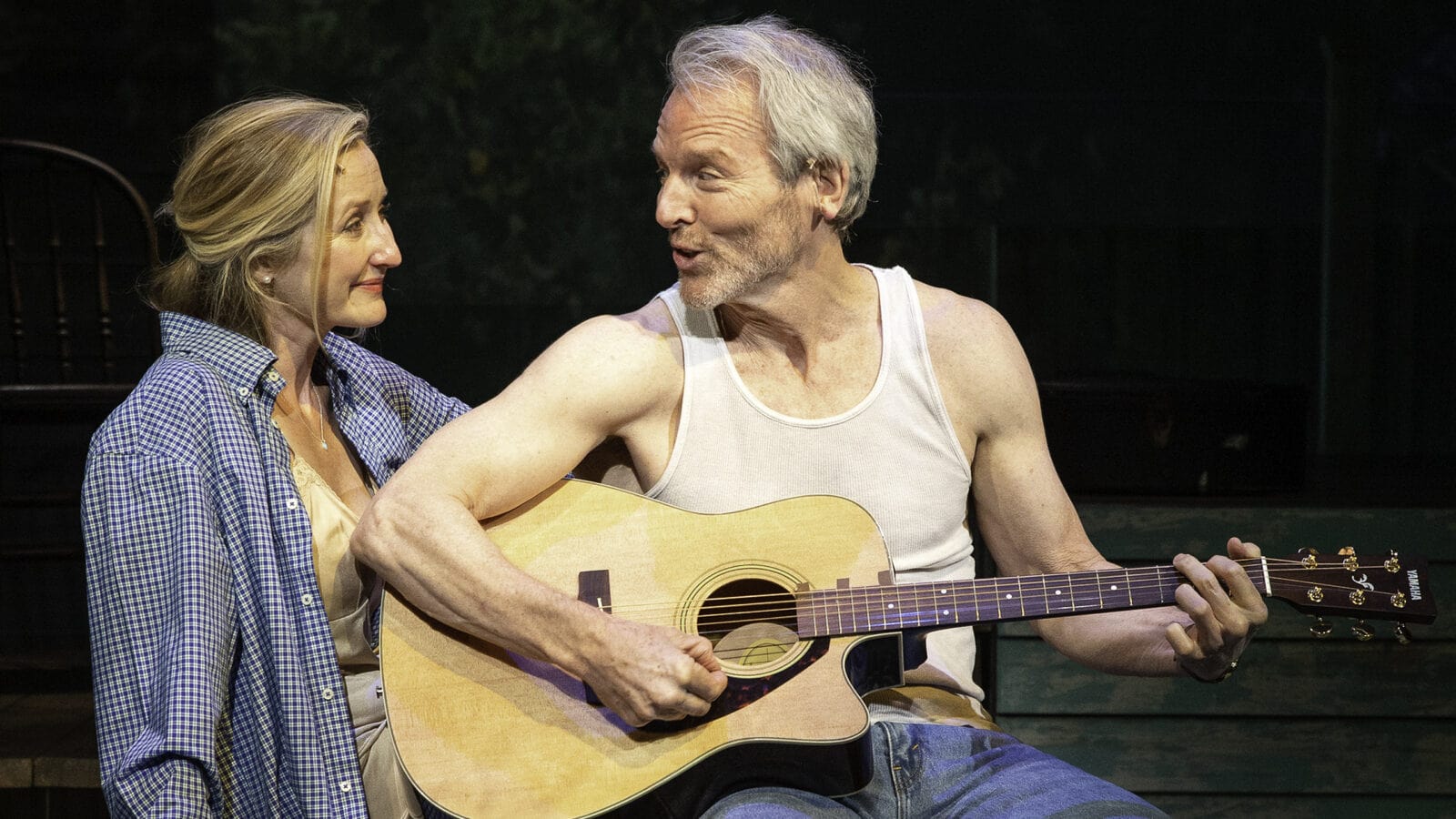A man and a woman walk through dry ferns to the edge of a pond in the woods. The water has withdrawn now in a record-breaking drought, but some remains.
They sit together on a rock on the lip, on the edge of possibility — two charismatic, intelligent people who are living alone, old enough for grown children and teenage grandchildren, testing the ground for how much they can trust.
It’s a summer night On Cedar Street, with Berkshire Theatre Group at the Unicorn Theater, in the world premiere by Tony-nominated playwright Emily Mann, with music by Lucy Simon and Carmel Dean, based on the novel Our Souls at Night by Kent Haruf.
Lauren Ward as Addie Moore and Stephen Bogardus as Louis Waters live in the mountains in Colorado. They have chosen to stay in a small town, not the rapidly thronging sprawl of Denver and the once-small towns outside that are turning into suburban commuter zones overnight.
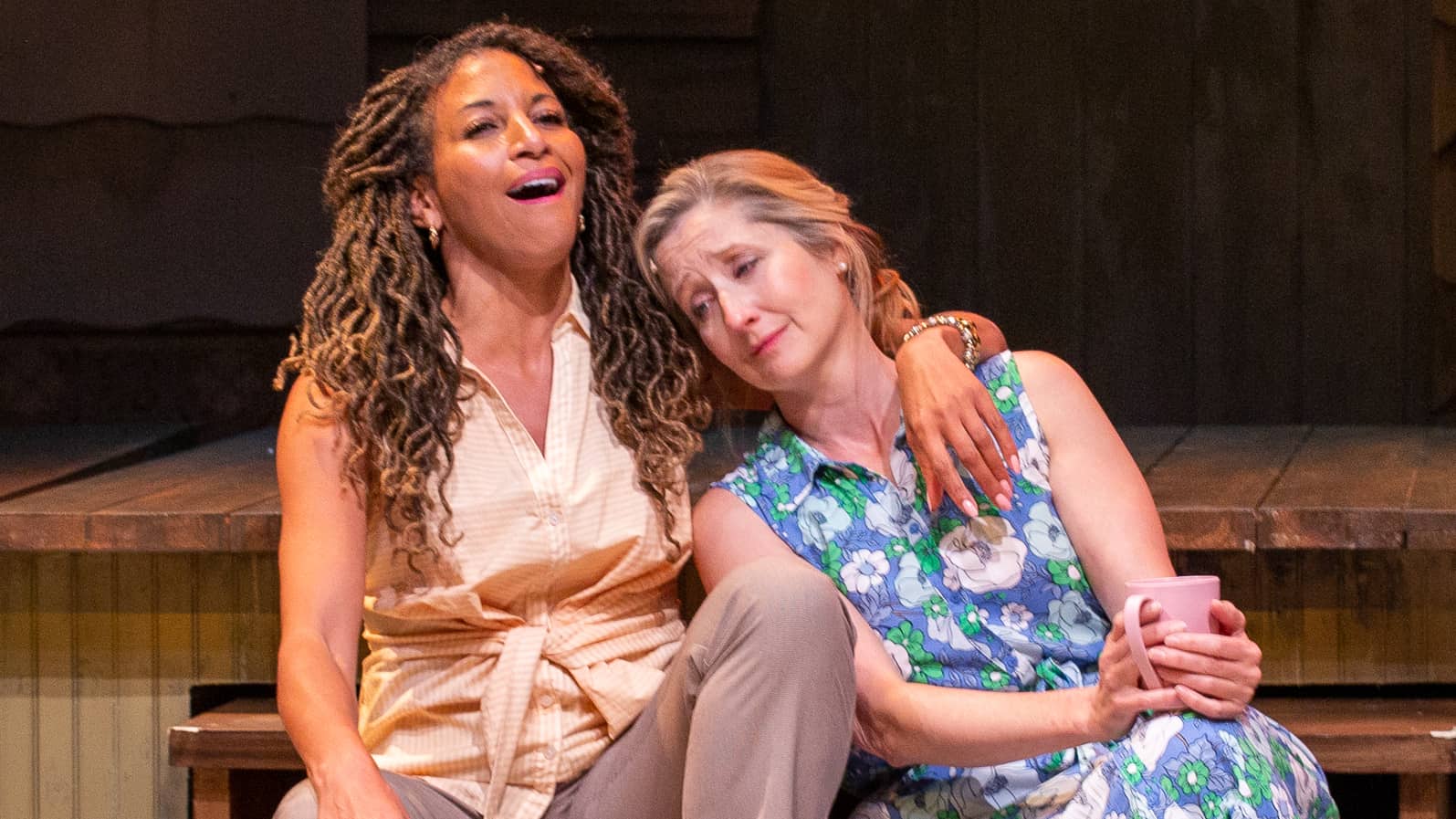
Lana Gordon and Lauren Ward sit leaning together on the steps in BTG’s production of On Cedar Street, 2023.
They sketch in a neighborhood in transition, between a kind of cautious liberal awareness — I care about equity and global warming even if I don’t know what to do about them — and a screw-you-all conservative obstructionism — I’m going to smoke my cigarette even if the sparks burn your house down.
One voice stands out as a clear call to action — Lana Gordon as Ruth Clark brings refreshing and deeply needed courage, humor and honesty, and she won a standing ovation for it from a contemporary crowd. Ruth has just won a challenging election and now has to enforce unpopular measures to protect her town in the increasingly dry heat.
And she knows this is only the beginning. She walks into this potential tension in one of the most musically powerful moments of the night, shaking the hall with her passionate declaration — We’ve got a situation!
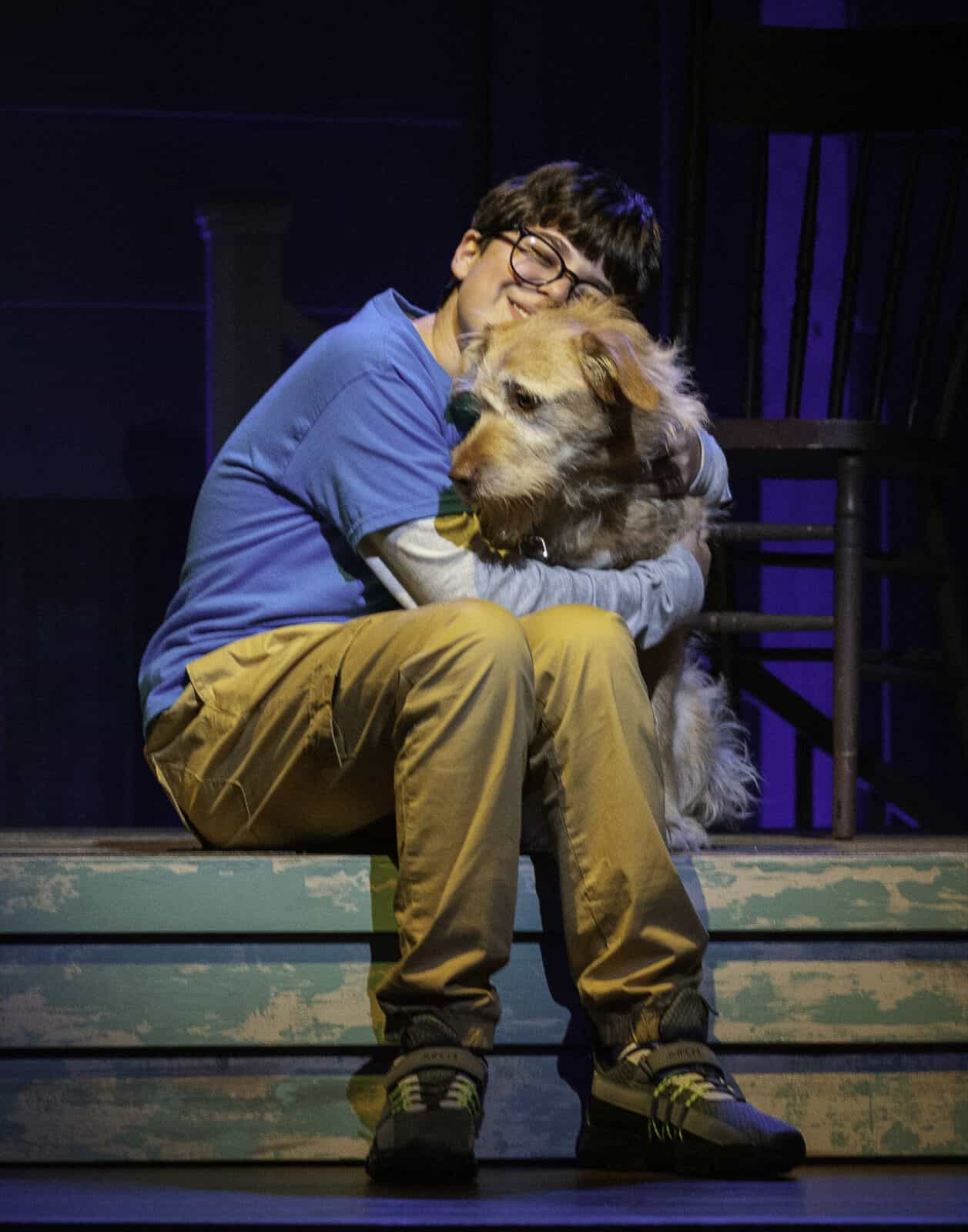
Hayden Hoffman as Jamie hugs Charlie the dog in On Cedar Street. Press Photo courtesy of Berkshire Theatre Group
The central situation as the play presents it, though, is a family story. Ben Roseberry as Gene Moore, Addie’s son, carries the greatest tension and drives the action, and he gives a forceful performance as a man hitting a wall in his work and in his life.
It’s a conflict the play jots down in broad strokes. Human currents are visible at the surface. Troubled by the childhood accident that cost his younger sister her life — and by pressures from his father that the play never explores — Gene has alienated his wife in some way, and his business and his child are suffering.
His mother comes on with a compelling strength, trying to inject humor into insomnia, a struggle with loneliness that will feel all too familiar after the isolation of the past few years. And she makes a clear move to change her life. It’s easy to imagine her walking on her lawn at night and seeing her neighbor’s light on over the deck.
Ward and Bogardus can warm the room with a believable pleasure in each other, and in the excitement and comfort in feeling close to someone, awakening a need they have each assumed would stay dormant.
But letting the spark catch is one thing — that can be easy in dry country. Believing the feeling can live, that it will warm the hearth and revive the ground, not rage into a wildfire or burn out … that’s something else.
In the past, both Addie and Louis have run away in their own ways. Addie tries to face chasms in her family with brownies and it will all be ok — and now her teenage grandkid isn’t having any. My mom’s gone. Things are wrong. Really, seriously, dangerously wrong. Don’t lie to me.
C. Wild Handel and Hayden Hoffman alternate performances as Jamie, vulnerable with a teenager’s directness and refusal to accept emotional dodging of the truth, and a need for comfort, and a still partial understanding of adult anger and grief.
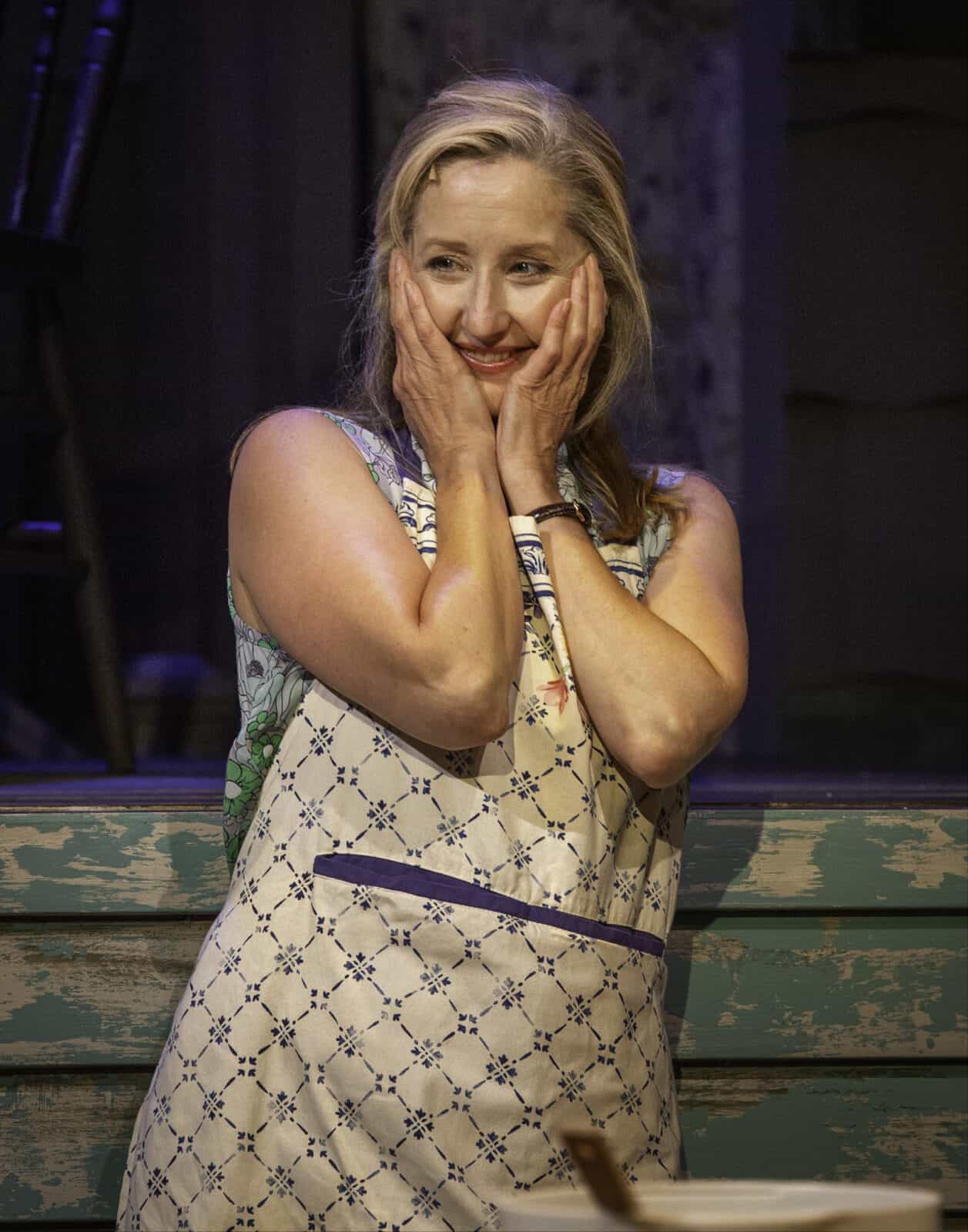
Lauren Ward as Addie grins in anticipation in BTG’s production of On Cedar Street, 2023. Press photo courtesy of BTG
In their blunt clarity they can underscore the lack of it around them, Louis, warm and thoughtful as he presents himself, has a tendency to fade away at the first sign of tension, a failing that can compound when the tension is internal. He seems to be alone now, not because his wife died of illness a few years ago, but because he left his wife and daughter, and the whole town knew it.
As he tells that part of the story, and he and Addie look tentatively toward the future, it seems most central for her to know why he left before — and whether he would do the same again. He says vaguely that things weren’t good at home. He was tempted and he knew it — ‘I was never in love with her. I was in love with who I was when I was with her.’
He raises questions without answering them: Why weren’t things good at home? Had his relationship with his wife gone sour, or had his relationship with himself gone sour? If he and Addie get together, when life gets hard will he have the guts to deal with it?
We want to believe they have a good chance. The story is gentle for a quiet summer night, and Addie and Louis can touch on stories we want to believe. They are meant to hold questions about honesty, what it takes and what it means to face hard times with courage. To do that with real power, the play itself will need to face the hard depths of people — beautiful and ugly, infinite and varied.
The music has an acoustic bluegrass and country feel, easy and upbeat as FM radio, and the lyrics are light. And often I wished for more of the story. Especially in a musical based on a novel, the characters should have depth in the hard edges of the pain they face and the shades of light when they do face it.
Addie and Louis rarely talk about themselves, and only in general terms … they’re giving the newspaper headlines for events in their lives 30 years ago, more than they are reveal indirectly and indirectly how they feel and what they see.
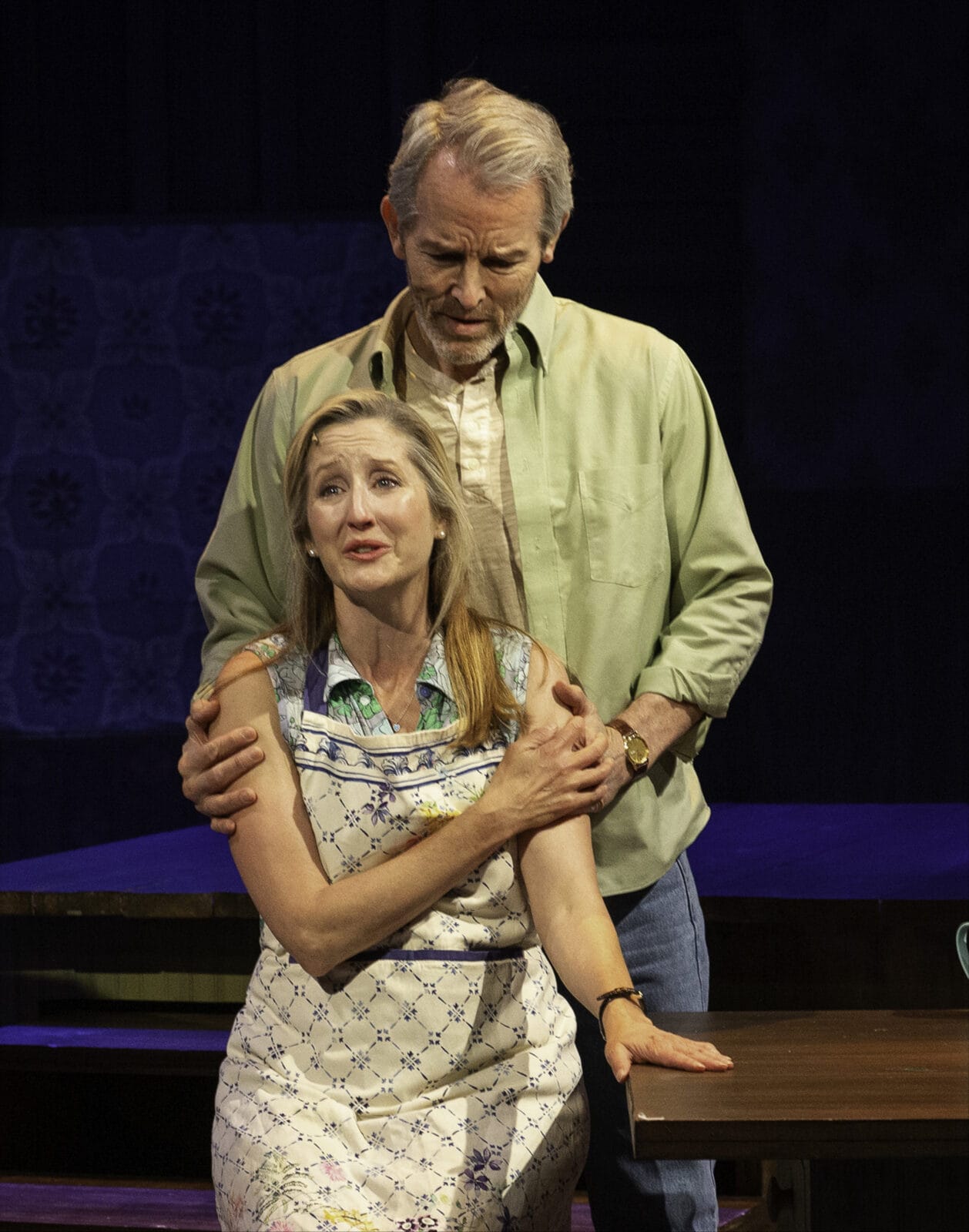
Lauren Ward and Stephen Bogardus comfort each other in BTG’s production of On Cedar Street, 2023. Press photo courtesy of BTG
That abstraction makes their dilemmas seem obvious. It always seems clear what they should do, what everyone’s right choices have to be. But human choices rarely feel that clear in the moment, when you’re close to them, when you’re the one making them.
Look closely into the tangle of love and fear, past and present — and Addie’s making a choice between a potential new relationship with a man she’s not sure she can trust and keeping in any kind of touch with her son … and her relationship with him is full of love and guilt for the boy she tried to protect and the man she doesn’t know how to reach, and both for herself as well.
When Gene tries to force a wedge between Addie and Louis, the real challenges they are facing come from themselves — they are facing their own limits.
Addie could not trust her husband. He turned his anger on her for years. She is afraid now that her son will do the same, and that he may take her grandchild from her. She wants to find some way to get through to Gene, to begin to heal the damage from his father, to remember his sister with love.
But how … is still an open question. Ruth and Louis tell her to stand up to her son and tell him the truth — but the challenge is harder than that. When Gene is acting out of anger and fear to this extent, if she stands up to him in any way, he is likely to respond with greater anger and fear. That pattern is dangerous, and she knows it.
Louis will need the courage to face his own fear and stand his ground and prove to Addie that she can trust him. He too will need to talk. He will need to prove to himself as well as to her, and to Gene and Jamie, that in this hard time he can be the man he told Addie he wants to be, with integrity, and he will need to see her clearly
Gene will need to deal with his anger and listen.
And the play suggests that this challenge has larger implications — how to get him to listen … embodies a problem or problems on a national scale, divisions the play hints at but never touches in any detail.
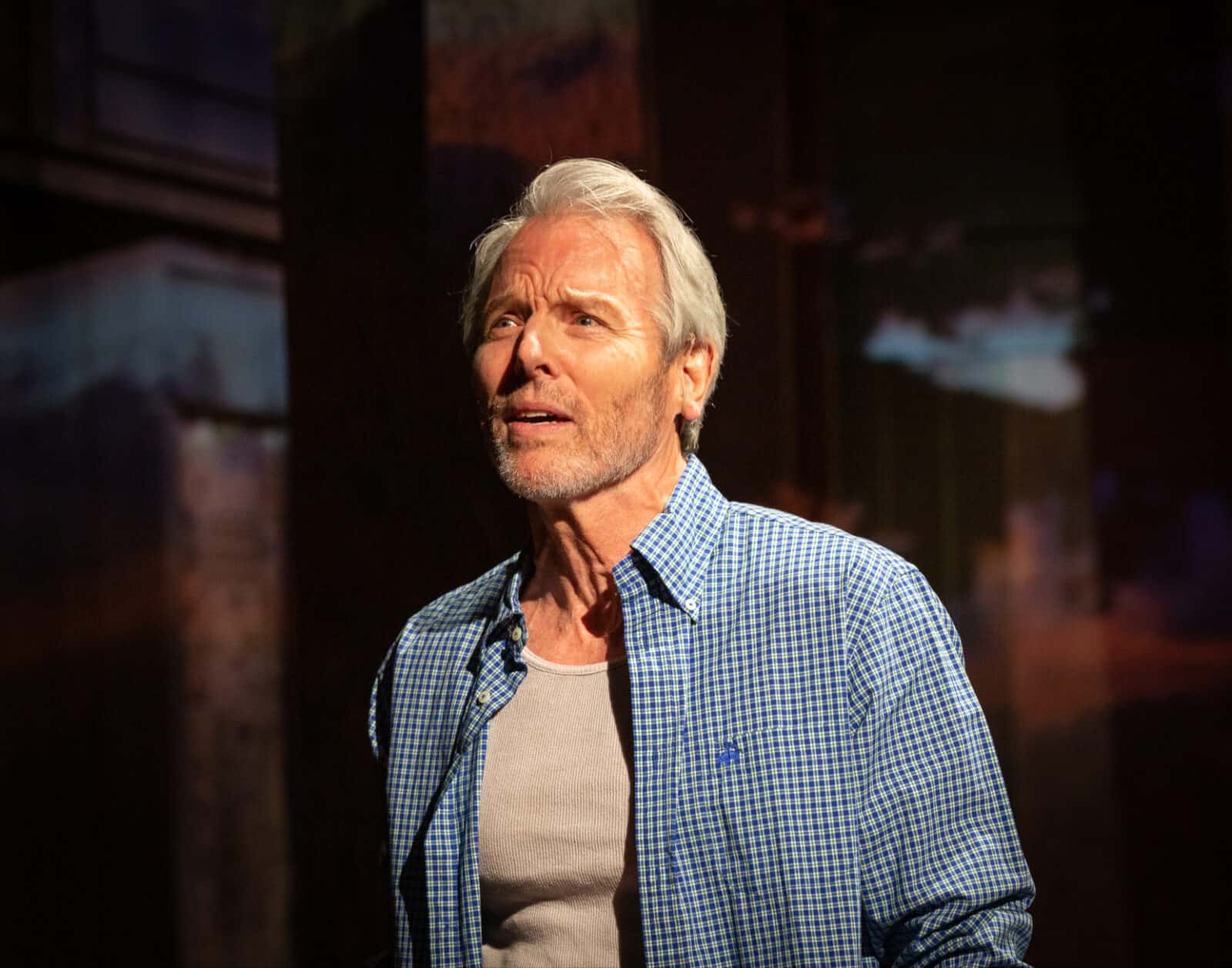
Stephen Bogardus as Louis wrestles with a moment of clarity in BTG’s production of On Cedar Street, 2023. Press photo courtesy of BTG
The people on Cedar Street are all also struggling with greater changes in the world around them. Ruth is the only one facing these realities squarely — climate change, racism, drought on a scale that can lose people their homes and shake the economy, political differences escalating to violence.
the second place the story line touches on a possibility and draws back from exploring in concrete terms — the story lightly brushes the real challenges Ruth is facing as an activist and a woman of color in a small, rural and largely white community, even with friends among her neighbors.
Dan Teixeira and Lenny Wolpe give voice to the conservative elements who oppose her, and they come across human and frustrated — the play hints at the damage they can cause but draws back from looking closely.
But the damage is real and lasting. When a frustrated old man who ‘just wants a cigarette’ really could burn his neighbor’s house down and flatly refuses to believe it — when a young man who sings a cheerful song about dogs also throws a rock through Ruth’s window — and when he owns a hunting rifle and jokes about using it — they are a very real threat under pressure.
They are under pressure. And they are acting dangerously. Lloyd insists that it’s freedom to light up when the drought warning level is dust-dry. But the narrative will show that danger and then draw back, turn the threat into a joke, try to suggest a bridge exists before Lloyd and Russell have shown any willingness to build one.
Ruth comes closest to making a true response to them — freedom means all of the neighbors have the right to live safely in their community.
Gordon gives Ruth’s character all the force of her nature, all the courage and conviction she would have to bring to running a political campaign and becoming a public face in a community where some of her neighbors are actively trying to make her feel unsafe in her own home. Yes, we do have a situation.
Ruth treats the challenge with directness, refusal to back down and wry humor.
Someone’s got to be the skunk
at the garden party …
But she knows the cost. We know she knows. And we know she’s vastly more than that. She’s the force making sure people can come to the party — and have a drink of water and talk with each other while they’re there — and see each other as human.
Given the time and the words, it seems clear she could say much more.

